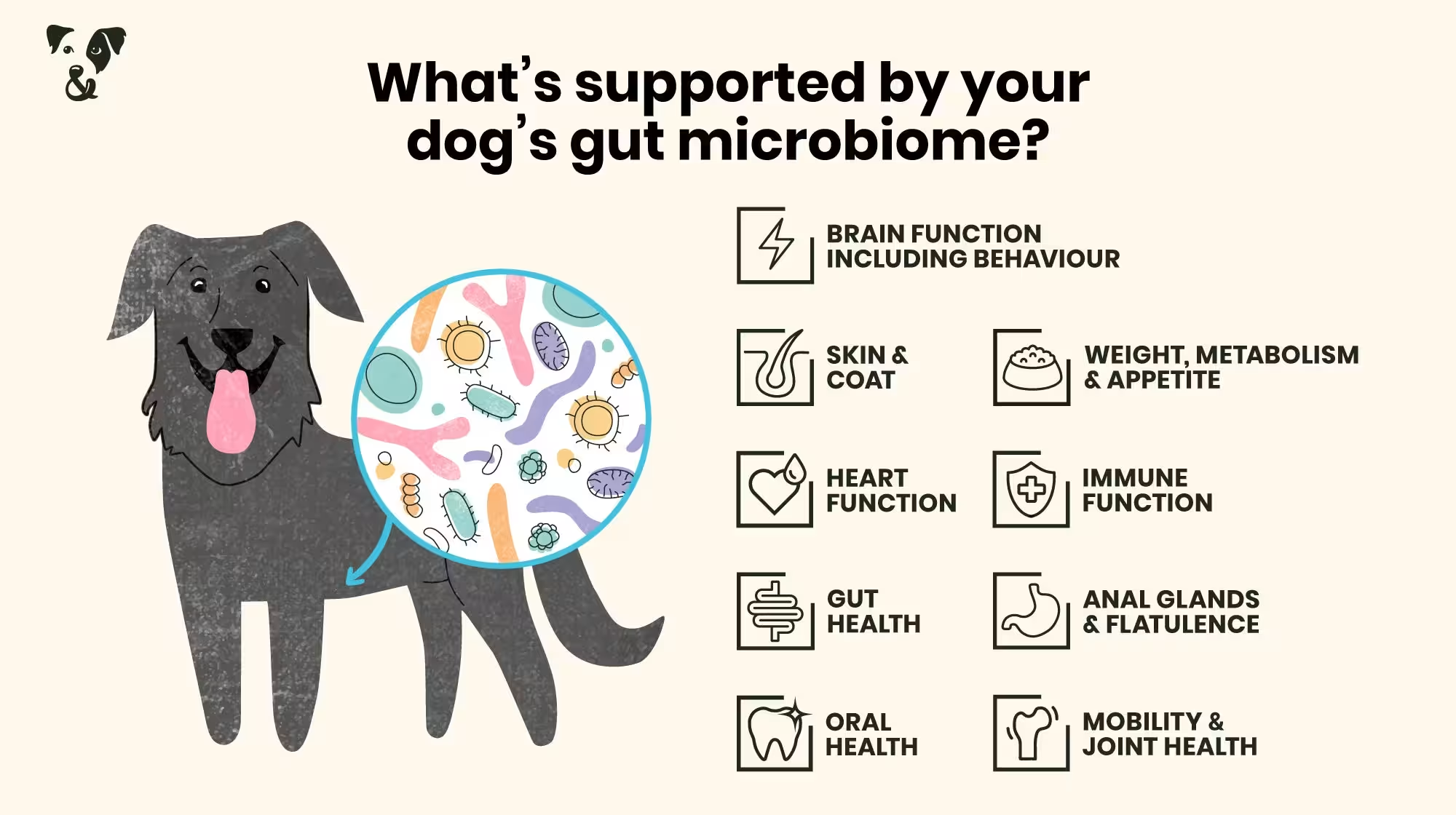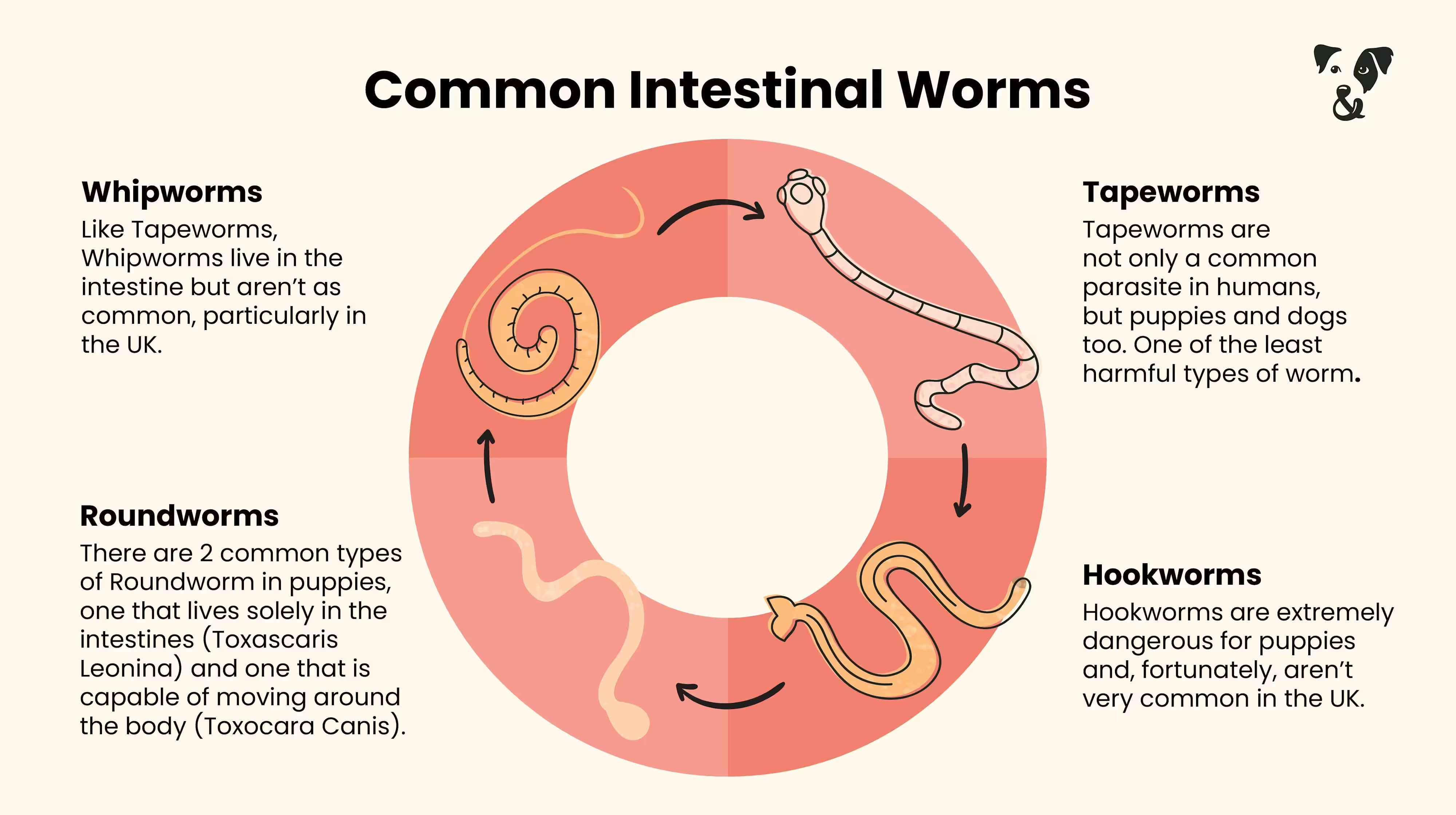Key Takeaways:
- A puppy's microbiome is partly obtained from their mother and during their birth, but continues to grow throughout time outside the womb, with their littermates, and when they come home to you.
- It can become imbalanced by their start in life, their breed, their birth, lack of time with their mother, their environment, worms, and other medical conditions.
- When a puppy's microbiome is knocked out of balance, it can impact them in later life.
Bringing home a new puppy can be an amazing whirlwind! Amongst all the excitement of a new addition to the family, there’s also the long and winding list of things to consider to ensure your pup has the best possible start in life. Between training, routines and avoiding little accidents in the house - what you might not be thinking about is investigating their gut health.
However, looking into the health of your puppy’s gut and their microbiome is crucial in setting them up for a healthy future. Puppies who start life with gut issues are at risk of suffering long-term.
Read on to explore why it’s so important to invest in your puppy’s gut health from the get-go, how to spot the signs, and what you can do to reduce the risk of long-term effects.
What is your puppy’s gut microbiome?
When talking about your puppy’s gut health, it's imperative that we explore their gut microbiome.
Where these aren’t the same thing, they’re intrinsically linked. The health of their gut microbiome aligns with the overall health of their gut, so it’s important that we include it in our investigations. But what is their gut microbiome?
Your dog’s gut microbiome is a mini ecosystem of predominantly bacteria that lives within their gut. The bacteria within the gut microbiome play a key role in the strength and function of many bodily processes, including but not limited to:

Digestion
Immunological function
Skin and coat health
Joint and mobility health
Cardiovascular health
Brain function and behaviour
The gut microbiome can only support these functions when the bacteria are rich and balanced. This means that they’re of varying species, but in equal proportion to each other. If one genus type takes over, this causes an imbalance and something referred to as dysbiosis.
Suffering from dysbiosis disrupts these functions, consequently causing detrimental symptoms. To investigate these symptoms and their overall gut health, a Gut Health Test is the best way to take a peek at what's occurring on the inside.


Gut Health Test
Get your results in 4 weeks, with our quick and easy, at-home Gut Health Test for dogs. One simple poo sample, analysed by our microbiologists, and you’ll get personalised recommendations to help your dog thrive.
*This item is excluded from all discount codes.
-
Science backed gut health insights
-
Online report including key health indicators
-
81% saw an improvement in their dog's health
Current price: £69.99
Gut Health Test
To learn more about your dog’s gut microbiome, explore ‘ Your dog’s gut health: What is a microbiome? ’
Where does a puppy’s gut microbiome come from?
Your puppy’s gut microbiome doesn’t just appear out of nowhere. It’s partly obtained from their mother and during their birth, but continues to grow throughout time outside the womb, with their littermates, and when they come home to you!
But how, and where exactly, are their microbial bacteria retrieved from?
Their mother. Puppies and dogs will pick up bacteria from any other animal they share a space with, and this is particularly the case between a puppy and their mother! Having been in her womb and remaining in close contact with her, the contents of their mother’s microbiota will be transmitted to her litter.
Their birth and delivery. Puppies pick up a lot of beneficial bacteria as they pass through the birthing canal. This adds to their microbial diversity and richness. Those born via caesarean section, like French Bulldogs, will miss out on this beneficial bacteria, so they’ll naturally have less diverse microbiota from the get-go.
Their mother’s milk. Puppies get a lot of beneficial bacteria through their mother’s milk, more specifically, from the colostrum in her milk. This makes the time spent with their mother crucial in the development of their gut microbiome.
Their diet. Puppies will feed solely on their mother’s milk up until 3-4 weeks of age, before transitioning onto puppy food. The milk, and eventually their new diet, also help provide prebiotics, probiotics, vitamins, minerals and nutrients that will continue to build their gut microbiome.
Their environment. Where the puppy grows in their first few months (whether that’s with a breeder, in a shelter, or in a home) will also contribute to their microbiome and its balance. This includes the people they interact with, other animals, the part of the world in which they live, and the type of outdoor space they have access to.
A puppy’s gut microbiome and its balance can map out their future health as adult dogs. This is why, as puppy owners, we want to do everything we can to ensure they’re getting the best start in life and their gut microbiome can be built for long-term success!
But just like later in life, there are some things that impact their microbial diversity that we can’t control. It just makes it even more important to crunch down on what we can do to help.
How can a puppy’s gut microbiome become unbalanced?
There are a lot of impacting factors that can affect the gut microbiome, which come from both the host (your puppy) and the environment in which they live.

By ‘impacting factors’, we mean things that can disturb the microbial balance of their gut microbiome, and lead to dysbiosis and associated symptoms. Since they’re constantly growing and developing, factors impacting your puppy’s gut health and microbiome should always be considered and assessed. Whilst a puppy’s gut will begin relatively healthy, their immune system is not.
With 70% of their immune cells living in their gut, perfecting their gut health still remains crucial in order for them to build a solid immune system. Starting life with anything other than optimal health can follow them into adult life and trigger other health conditions. The main impacting factors on a puppy’s microbiome may include:
Their start in life. From being a rescue, being shipped from overseas, or starting life with an unreputable breeder - all of these factors can have a negative impact on a puppy’s developing gut microbiome. This is due to being exposed to more harmful bacteria and missing out on opportunities to contract beneficial bacteria from a healthy environment.
Their breed. Some breeds naturally have a more or less diverse gut microbiome. This is due to dietary evolution and heritage. For example, Akita’s have evolved on high-protein diets, so their bodies are better at digesting it.
Their mother. A mother transmits a lot of her bacteria to her litter. If the mother has any existing conditions that impact her own gut microbiome, this can be passed to the puppy.
Worms and parasites. Puppies are extremely prone to worms in the early days, many being born already infected. Some intestinal worms and parasites can easily impact their microbial balance and cause other underlying health conditions. Giardia, another common parasitic worm in puppies, can majorly disrupt their gut microbiome and leave it unbalanced even throughout adulthood. This can even occur when the Giardia is treated whilst still a pup.

Change in environment and diet. A big part of most puppies’ lives is finding their forever home! This change, and all the other changes that come with it, can also impact their microbial diversity. This can stem from a change in environment, diet and household.
Medical conditions and treatment. With developing immune systems, puppies are also prone to contracting illnesses and needing treatment in their early days. Many medical conditions, whether they’re long-term or short-term, can also impact their gut microbiome. Plus, any medication or treatment they receive can have the same effect, especially antibiotics. This particularly requires gut health intervention!
To learn more about the effects of antibiotics, check out our article ' How antibiotics affect your dog's gut health '.
Signs of gut health issues in puppies
As everything about a puppy is still growing and developing, showing symptoms that stem from their gut health is extremely common. With all the changes they experience in their early life, they can become unsettled, and the same can be said for their delicate gut microbiome.
To monitor whether their gut’s causing them significant trouble, signs to look out for may include:
Runny poos, diarrhoea or constipation. This could also include blood in their stools. The latter should always be checked by a vet.
Vomiting
Bloating
Lack of appetite
Skin and coat issues
Tummy gurgling and discomfort
Unusual lethargy and fatigue
Whilst these symptoms can be directly linked to your puppy’s microbiome, until that’s ruled out, they could also be indicating other underlying health conditions. If dysbiosis and gut-related issues have been ruled out, be sure to contact your vet. Something considered minor for an adult dog, could be fatal for a puppy.
How do I investigate my puppy’s gut health?
The best way to investigate your puppy’s gut health and assess the balance and diversity of their gut microbiome is through a Gut Health Test .
With a Gut Health Test at Pooch & Mutt, we start by sending everything you need to retrieve a poop sample from your dog. Once you’ve completed the Activation Quiz and sealed up your sample, simply pop it in the post using the free returns label and it’ll arrive at our lab!
Once there, their poop will be analysed to gain a representative insight into their microbial balance. This, alongside other information about your dog like age, breed, lifestyle and medical history, means we can provide an outlook of your dog’s gut health, their gut microbiome, and how it may affect other areas of their body.
From these results, we’ll recommend a completely tailored diet and a 3-stage Gut Health Supplement Plan , that’ll support identified problem areas and get your pup feeling back on track.


Gut Health Test
Get your results in 4 weeks, with our quick and easy, at-home Gut Health Test for dogs. One simple poo sample, analysed by our microbiologists, and you’ll get personalised recommendations to help your dog thrive.
*This item is excluded from all discount codes.
-
Science backed gut health insights
-
Online report including key health indicators
-
81% saw an improvement in their dog's health
Current price: £69.99
Gut Health Test
Should a puppy do a Gut Health Test?
Puppies tend to naturally have the highest gut health scores overall, likely because they’re young, resilient, and generally healthy.
The thing to keep in mind is that if you decide to test your dog again as an adult, the score might look lower in comparison. But that’s not necessarily a bad thing. It just reflects the natural changes as the gut microbiome matures with age.
If you’re interested in looking into your puppy’s gut health, then you should start right here with a Pooch & Mutt Gut Health Test.
With easy-to-digest Gut Health Results , you’ll receive a completely tailored diet and supplement plan that will kick their life off in the best way possible. Explore more about gut health at Pooch & Mutt , or contact us with any questions or queries at [email protected].




